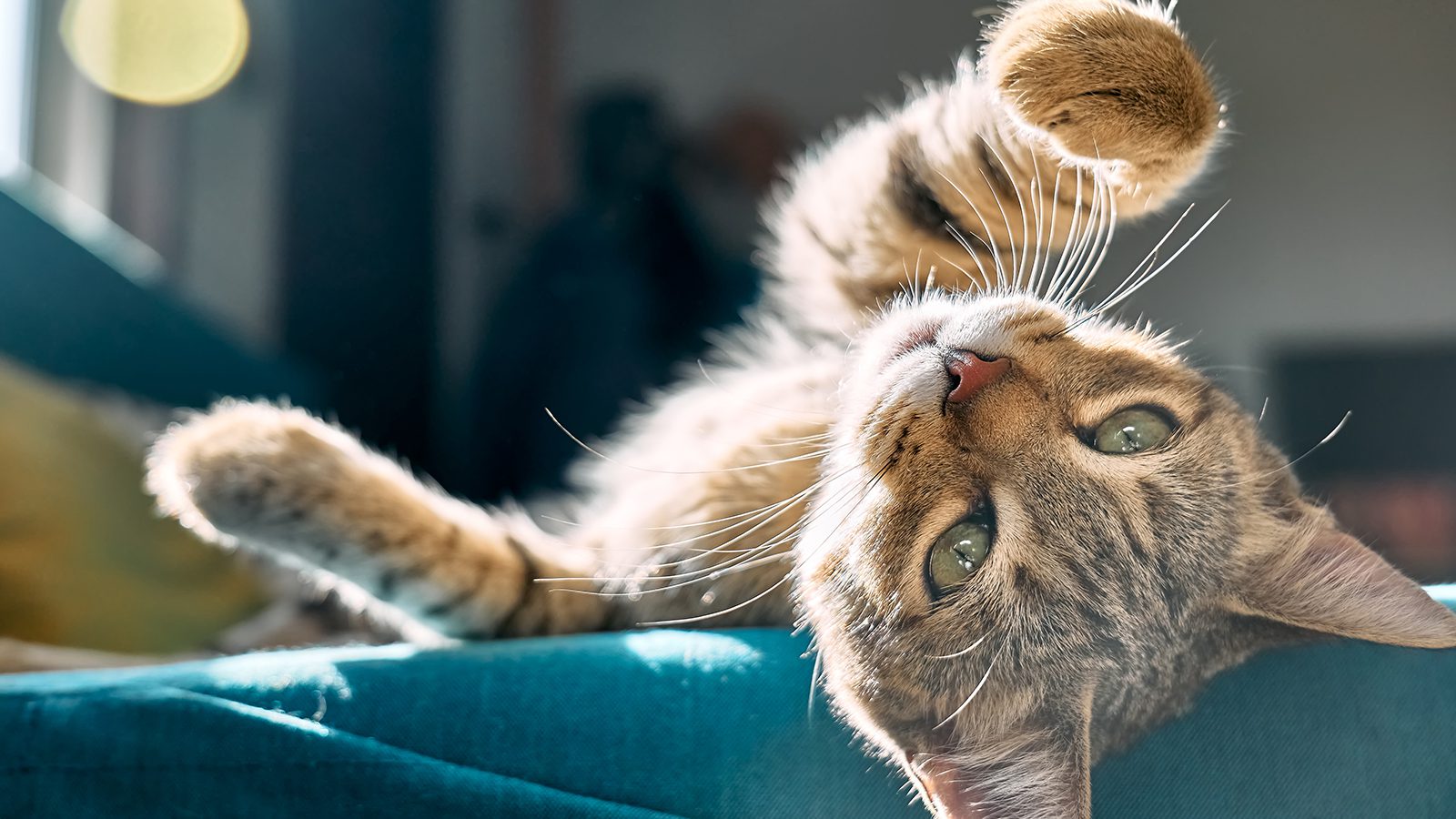Typically, you don’t associate the word psychopath with your pet. But, pet psychologists have found a surprising connection between psychopathic behavior and cats. They say felines display common traits of a human psychopath. So, whether you agree with these pet psychologists, the six traits researchers say prove that your cat could be a psychopath.
A behavioral study uncovered psychopathic traits in felines.
A study at the University of Liverpool and Liverpool John Moores University suggests that cats have some psychopathic behaviors. They say the behaviors vary in degrees from one feline to another. Their results came from a questionnaire they gave to 549 feline owners who they asked to answer specific questions describing their kitties. The questionnaire measured psychopathy in cats. The owners shared examples of their pet’s behavior in the context of these five areas.
- Boldness
- Disinhibition
- Meanness (aggressiveness)
- Unfriendliness towards other pets
- Unfriendliness toward humans
Feline owners shared examples of how their cats showed these behaviors. For example, one cat owner said their cat torments their prey instead of killing it immediately. As a result, some of the questions they asked on the questionnaire included whether their pet did these things:
- Tormented its prey instead of killing it
- Dominated the neighborhood
- Chased owners or other humans
- Picked fights with humans and other pets
- Acted undeterred when punished for bad behavior
- Ignored scoldings
- Made loud yowls and meows for no reason
Researchers found that cats have psychopathy traits that probably helped their wild ancestors find food, mates, and shelter. Pinpointing these undesirable behaviors could help kitty owners better understand their pets.
Pet Psychology Reveals 6 Psychopathic Traits That Cats Display
Do you see these behaviors in your kitty?
1. Aggressiveness (meanness)
Human psychopaths lack empathy. They have no trouble hurting others, often displaying cold-heartedness when pursuing their goals. Cats often show similar behavior in their attitudes towards their owners or other animals. Meanness and disobedience are why some new owners return a kitty to a shelter. Cats may display malice through:
- Hissing
- Scratching
- Biting
- Grabbing your legs
- Spitting
- Growling
If your kitty is acting like this, it’s wise to steer clear of them until they calm down. After a cool-down period, they will usually return to more loving behavior.
2. Disobedience
Felines can be naughty. Your cat may jump on your kitchen table, eat your food and be indifferent to your demands for them to stop. Whether or not they do these things on purpose is hard to know. But kitties are smart, and they can refuse to obey. One woman told the story about her cat pooping on her Bible when she left the cat alone for long periods. Of all the places the cat chose to do their business, pooping on the Bible seemed a great way to get her attention. It did. Some people say cats disobey when they’re bored. This observation may be accurate, but if researchers are correct, cats are psychopaths with little regard for their owners or their owner’s property.
3. Uninhibited
Human psychopaths can’t control their urges or emotions as other people can. They act on impulse. Many of their actions are socially unacceptable. Cats like to be alone and can be manipulative with little regard for humans or other animals. Scientists say that before cats were domesticated, psychopathic behavior may have helped wild cats survive. Domestic cats no longer need to look for food or find a mate. So, their lack of inhibition increases because they don’t have an outlet. Finding ways to keep your cat entertained and challenged will help eliminate these behaviors.
4. Boldness
Psychopaths don’t react to stress in the same way most people do. They lack fear when in situations that most people find incredibly frightening. Similarly, cats display boldness in cases that other animals would find fearful. They love to climb high up in trees or run on top of houses. They face large animals without fear. Incredibly bold cats may need access to tall scratching posts or areas where they can stalk and explore. Otherwise, they’ll get into trouble by starting fights with other pets in the house. Particularly bold cats may become antagonistic towards their owners.
5. Callousness
Someone who is psychopathic lacks normal emotions. They’re cold-hearted and callous towards other people’s suffering. Cats often seem to act this way. If you’ve ever watched a cat catch a mouse, you know this is true. A cat will play with its poor prey, batting it back and forth like a toy instead of killing it.
6. Anti-social
Anti-social behavior and callousness connect to psychopathy in animals. Cats act as aloof and independent animals. Besides that, they don’t always like dogs. If there’s a dog in the house, some cats enjoy tormenting the dog into obedience. It’s frustrating, and this behavior makes felines seem mysterious and hard to understand.
How to help your cat be less of a psychopath?
Of course, you can’t take away your cat’s ancestral wild behavior, but you can help calm its over-the-top behaviors. Here are several tips to help alleviate your feline’s psychopathic traits.
Structure in Playtime
Your cat needs playtime as an outlet for energy. If they don’t have ways of letting go of power, they get into trouble climbing where they shouldn’t or tormenting your dog trying to take a nap.
Every day, schedule time to play with your beloved pet. Some things you can do during your structured playtimes include:
- Use cat toys to inspire their curiosity and playfulness. Allow your cat to pounce on the toys to simulate catching their prey.
- Use LED lasers to bounce light on the wall so your cat can chase it.
- Food dispensing toys to allow them “hunt’ for their food
- These playtimes should be no longer than ten minutes to avoid overstimulating your kitty, so they become aggressive.
Check your cat for hyperthyroid issues.
Some of the kitty’s negative behavior could be due to health problems. Older felines are prone to developing hyperthyroidism. Cats with an overactive thyroid gland display behaviors such as these:
- Irritability
- Insomnia
- Weight loss
- Huge appetite
- Bursts of energy
Talk to your local vet if you notice your pet showing these behaviors. Treatment is medication, surgery to remove the thyroid gland, or radioactive iodine therapy.
Build peace into your house
Your cat’s ancestors were independent hunters. They don’t do well with other animals. Having multiple kitties or other pets in our house can stress cats out. They may exhibit distress by urinating on furniture to mark their territory or pooping outside their litterbox. Of course, some kitties get along with other animals. These felines may even need a friend to play with, But if you notice your cat isn’t happy, find ways to build harmony in your household.
Create a safe outdoor place for your cat
Felines need to creep around to entertain themselves. They’ll get into trouble when cooped up too much. But kitties and other animals can be dangerous to domesticated cats. You can use a harness leash for your cat to allow them time outside. A leash gives them time to explore their backyard safely.
Another solution is to build a catio for your feline. That structure is a little patio or sizeable caged-in area for your feline friend. It’s usually made outside a door or window so your cat can come and go on its own. A catio allows your kitty to enjoy independent outdoor play without fear for their safety.
Accept their behavior
Sometimes it’s best to accept your kitty’s behavior rather than trying to change it. For example, sudden energy bursts are regular for pets. They like zoomies. If you try to stop them, it won’t help them or you. But, of course, if they act dangerously or hurt another pet or person, you must end that kind of behavior immediately. Redirect them when your cat displays unfriendly behavior with toys, treats, or other outlets for their energy.
Cats aren’t alone in their psychopathic behavior.
According to studies, cats aren’t the only animals with psychopathic tendencies. Certain dog breeds have particular traits linked to this behavior. For instance, Basenjis cannot avoid temptations, and bull terriers show indifference to punishment and fearlessness. Besides dogs, researchers say chimpanzees display psychopathic behavior of meanness.

Final thoughts on a study that finds your cat might be a psychopath
Scientists hope learning about cats’ psychopathic tendencies will help improve feline-owner relationships. A better understanding of what makes kitties tick could help reduce the number of felines taken to shelters because of bad behavior. Plus, it could help identify undesirable behaviors of the owners and help create an environment for better behavior. Whether or not you agree with pet psychologists that felines are psychopathic, it’s at least interesting to consider your pet’s psychopathic traits. Your feline may be expressive and unfriendly towards other animals and people.
Feline meanness, boldness, and anti-social behavior are similar to human psychopathic behavior. Of course, each furry friend is unique and displays these behaviors at varying levels. You don’t need to be afraid of your cat’s unusual ways. Pet ownership is a great experience. It helps you learn about your kitties and how to live harmoniously with them.



















